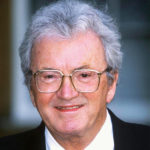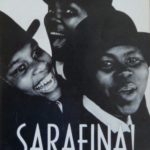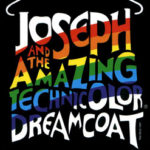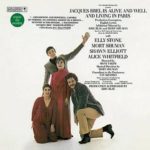 Happy Birthday to multi-award-winning composer Leslie Bricusse, born Jan. 29, 1931, in London. He attended Cambridge, where he was president of the Footlights Revue Club, founded the Musical Comedy Club, and created his first two musicals, Out of the Blue and Lady at the Wheel. Actress Beatrice Lillie plucked him from Footlights to be her leading man in An Evening with Beatrice Lillie, and he spent the first year of his professional life writing the musical The Boy on the Corner and the film Charley Moon, which earned him his first Ivor Novello Award, leading him to drop performing and concentrate on writing. Since then, Bricusse has written more than 40 musical shows and films. Below is the trailer for the 1956 film Charley Moon.
Happy Birthday to multi-award-winning composer Leslie Bricusse, born Jan. 29, 1931, in London. He attended Cambridge, where he was president of the Footlights Revue Club, founded the Musical Comedy Club, and created his first two musicals, Out of the Blue and Lady at the Wheel. Actress Beatrice Lillie plucked him from Footlights to be her leading man in An Evening with Beatrice Lillie, and he spent the first year of his professional life writing the musical The Boy on the Corner and the film Charley Moon, which earned him his first Ivor Novello Award, leading him to drop performing and concentrate on writing. Since then, Bricusse has written more than 40 musical shows and films. Below is the trailer for the 1956 film Charley Moon.
His most frequent collaborator has been Anthony Newley. Their first West End show was Stop the World — I Want to Get Off (1961), starring Newley and Anna Quayle. David Merrick brought the production to Broadway in 1962, and it received five Tony nominations, including musical, book, and score. Its finale, “What Kind of Fool Am I?,” also earned Bricusse and Newley the Novello Award and the Grammy Award for best song of the year, while the cast album earned a Grammy nomination. Below is Newley singing “What Kind of Fool Am I?” in his 1969 Hollywood Palace show (starting about 1:30).
After cowriting “Goldfinger” with John Barry for the 1964 Bond film, the team’s next show was the 1965 Broadway musical The Roar of the Greasepaint — The Smell of the Crowd, which earned six Tony nominations, including score. Its first act closer, “Who Can I Turn To?,” earned Bricusse and Newley another Grammy nomination for song of the year. Below is Newley singing “Who Can I Turn To?”
Their other collaborations include the score for the 1971 film Willy Wonka & the Chocolate Factory, earning an Oscar nomination. Its song “Candy Man” spent three weeks at #1 on the Billboard charts in 1972. Bricusse went solo for the score to the 1967 film Doctor Dolittle, earning an Oscar for the song “Talk to the Animals” and a nomination for the score, and the 1970 film Goodbye, Mr. Chips, which also earned Bricusse an Oscar nomination for score. Below is Sammy Davis Jr. singing his chart-topping “Candy Man.”
Working solely as a lyricist, Bricusse has collaborated with a range of composers. With Cyril Ornadel, he scored the stage musical Pickwick (1963). With Ian Fraser, he earned an Oscar nominations for the score to the 1970 film Scrooge and its song “Thank You Very Much,” which you can watch below, performed by Anton Rodgers and the film cast.
With Henry Mancini, he won an Oscar and earned a Grammy nomination for the score of the 1983 film Victor/Victoria, as well as an Oscar nomination for the song “Life in a Looking Glass” from the 1987 film That’s Life. With John Williams, Bricusse earned Oscar noms for the songs “Somewhere in My Memory” from the 1991 film Home Alone and “When You’re Alone” from the 1992 film Hook. Below is Julie Andrews singing “Le Jazz Hot” from Victor/Victoria.
Bricusse was last represented on Broadway with the book and lyrics to Jekyll & Hyde, which brought him his fifth Tony nomination, and four songs from the film Willy Wonka interpolated into the score of Charlie and the Chocolate Factory (2017). Below is Robert Cuccioli singing “This Is the Moment” from Jeyll & Hyde.









